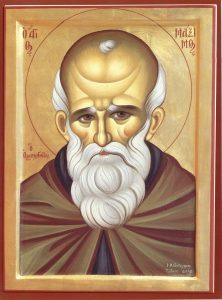 August 13 is the feast-day of St. Maximus. Because it is also the leave-taking of the Feast of the Transfiguration of our Lord, the liturgical commemoration is transferred to Saturday. Today Maximus is considered one of the “pillars of Orthodoxy,” and Fr. John Meyendorff called him “the father of Byzantine theology.” His accomplishments are many – he was martyred because of his faithful defense of the incarnation of our Lord, that he was truly human in every way (except sin) and had a human will. He had to live many years in exile.
August 13 is the feast-day of St. Maximus. Because it is also the leave-taking of the Feast of the Transfiguration of our Lord, the liturgical commemoration is transferred to Saturday. Today Maximus is considered one of the “pillars of Orthodoxy,” and Fr. John Meyendorff called him “the father of Byzantine theology.” His accomplishments are many – he was martyred because of his faithful defense of the incarnation of our Lord, that he was truly human in every way (except sin) and had a human will. He had to live many years in exile.
[Maximus] has become much more respected in recent years, I think, because his theology has much to say to the modern world. His theology of deification calls us to see the world as more than “materialism,” only what we can see or hear or touch. He teaches us that there is more to our existence, a spiritual dimension that surpasses bodily passions and concerns. Reading Maximus, however, can be very difficult. He was committed to Greek literary and rhetorical styles, appearing in long. convoluted sentences. He also used the vocabulary of Neo-Platonism, which few can understand today. Many of his works have been translated into English, and his best are the Four Centuries on Love, his Commentary on the Our Father and his work on the Liturgy, The Church’s Mystagogy. All are found in the Paulist Press series “The Classics of Western Spirituality,”: Maximus Confessor: Selected Writings,” translated by George Berthold.
Today, we pray: “Taking its abode within your heart, the thrice-brilliant light made you a chosen vessel. It has revealed heavenly things in you, O blessed saint. You made deep and complicated ideas clear to us, and you preached the eternal Trinity to everyone, O Maximus.“ (Kontakion)
Meditation by Archpriest David Petras